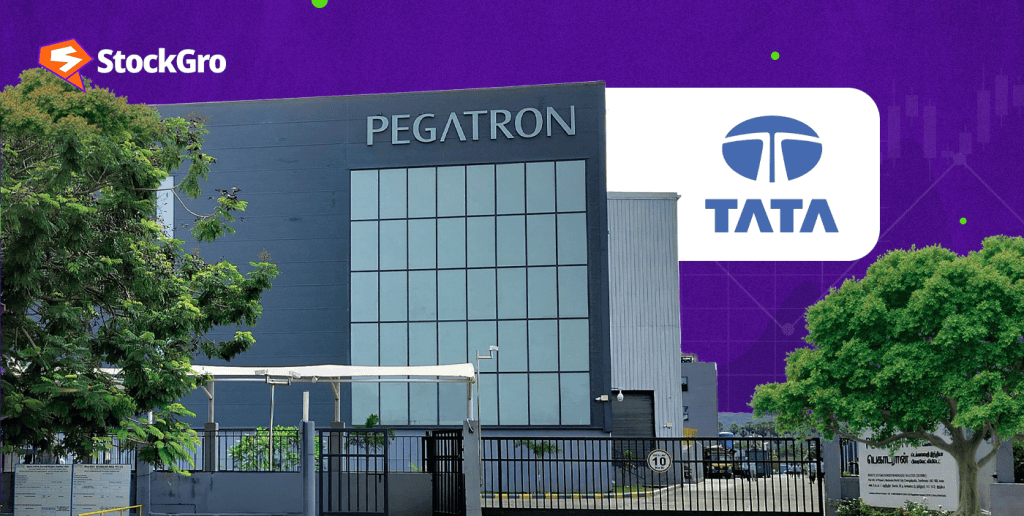
India’s iPhone manufacturing sector is on the brink of a significant transformation. Tata Electronics, a Tata Group company, has officially acquired a 60% majority stake in Pegatron’s iPhone manufacturing unit located in Tamil Nadu. This development is not just another corporate deal; it’s a milestone reflecting India’s growing role in global technology supply chains. Let’s break this down and explore why this move matters for Apple, Tata, and India’s economic landscape.
Understanding the Tata-Pegatron Deal
Tata Electronics, a subsidiary of Tata Sons, has acquired a controlling stake in Pegatron’s Tamil Nadu-based iPhone factory. Pegatron, a Taiwanese company and a key Apple supplier, has sold a majority of its shares in this plant, marking a strategic shift in India’s role as a global manufacturing hub for iPhones.
Also Read: NALCO Stock rises 5% following strong Q2 Results
Deal specifics: What’s in the contract?
- Tata now owns 60% of Pegatron’s Tamil Nadu iPhone manufacturing unit, securing majority control.
- Pegatron retains the remaining 40% stake, ensuring continued operational support and expertise.
- This facility is Apple’s second manufacturing plant in India, following Foxconn’s operations in the country.
This acquisition aligns with Tata’s broader ambitions to diversify into high-tech electronics and deepen its ties with Apple.
Why Tamil Nadu Is at the Heart of This Deal
Tamil Nadu has long been a preferred destination for manufacturing in India, thanks to its skilled workforce and supportive policies. Pegatron’s iPhone unit, located in Chennai, is no exception.
Key highlights of the Tamil Nadu iPhone unit
| Feature | Details |
| Location | Chennai, Tamil Nadu |
| Initial Investment by Pegatron | $150 million |
| Workforce | Over 10,000 employees |
| Products Manufactured | Apple’s iPhone models |
| Ownership After Deal | 60% Tata Electronics, 40% Pegatron |
Tamil Nadu’s strategic proximity to ports and its investor-friendly ecosystem make it a magnet for global tech players like Apple and Tata.
You may also like: Best IT Sector Penny Stocks to Invest in India for 2024
Tata’s Big Leap into Apple’s Supply Chain
Tata’s acquisition isn’t just a corporate transaction; it’s a step toward making India a critical node in Apple’s global supply chain. For years, Apple has relied heavily on China for its iPhone production. However, the tech giant is now diversifying its manufacturing base, and India is emerging as a strong contender.
What this means for Tata
- Enhanced role in high-tech manufacturing: Tata Electronics’ majority stake positions the conglomerate as a key Apple supplier.
- Boost to Tata’s brand equity: Being associated with Apple enhances Tata’s credibility in the global tech space.
- Economic impact: A stronger Tata means more jobs and economic benefits for India.
This move also aligns with India’s Production-Linked Incentive (PLI) scheme, which encourages domestic manufacturing in electronics.
You may also like: Zinka Logistics IPO opens: Key details on Price, GMP, and Dates
What’s in It for Apple?
Apple’s reliance on China for iPhone production has been under scrutiny due to geopolitical tensions and supply chain disruptions. By expanding its manufacturing base in India, Apple is hedging its risks and strengthening its global strategy.
Why India fits Apple’s manufacturing goals
- Cost advantages: Labour costs in India are significantly lower than in China.
- Market growth: India is one of Apple’s fastest-growing markets.
- Government incentives: India’s PLI scheme offers substantial benefits for electronics manufacturers.
With Tata now in the fold, Apple has a reliable partner to scale its India operations.
Also read: NTPC Green Energy’s ₹10,000 Crore IPO Details
The Economic Ripple Effect
The Tata-Pegatron deal has far-reaching implications for India’s economy.
How the deal benefits India
| Aspect | Impact |
| Job creation | Thousands of new roles in Tamil Nadu’s tech sector |
| Foreign investment | Boosts India’s image as a global investment hub |
| Technology transfer | Access to cutting-edge manufacturing expertise |
| Export potential | Positions India as a global iPhone supplier |
This acquisition is a testament to India’s growing importance in the global electronics supply chain.
Challenges Ahead for Tata Electronics
While the deal is promising, it’s not without its challenges.
Key obstacles Tata might face
- Scaling up production: Meeting Apple’s stringent quality standards is no small feat.
- Supply chain management: Ensuring a smooth supply of raw materials will be critical.
- Global competition: Competing with seasoned players like Foxconn and Pegatron won’t be easy.
However, Tata’s track record in managing large-scale operations across industries could be its biggest advantage.
What This Means for You as an Investor
If you’re into stocks or keen on tracking financial markets, this deal is one to watch. Tata’s entry into high-tech electronics could unlock new revenue streams, making it an attractive option for investors.
Value for investors
| Aspect | Why it matters |
| Diversification | Tata is moving beyond traditional industries like steel |
| Growth potential | High-tech electronics is a booming sector |
| Global positioning | Strengthens Tata’s role in international markets |
Closing Thoughts
Tata Electronics’ acquisition of a majority stake in Tamil Nadu’s iPhone manufacturing unit is more than just a business deal—it’s a turning point for India’s manufacturing and economic landscape. It highlights the country’s growing relevance in global tech supply chains and sets the stage for future growth.
As Apple continues to diversify its production and Tata steps up as a key partner, this partnership could redefine India’s role in the global economy. Whether you’re a tech enthusiast, an investor, or someone excited about India’s growth story, this is a development to keep an eye on.

